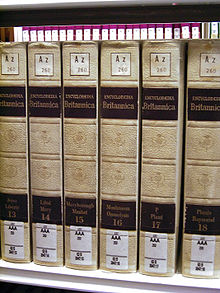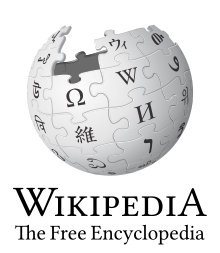Wikipedia:Wikipedia Signpost/2010-11-22/Book review
The Myth of the Britannica, by Harvey Einbinder
Harvey Einbinder, The Myth of the Britannica. New York: Grove Press, 1964. 390 pages.

Harvey Einbinder's extended criticism of the Encyclopædia Britannica grew out of an article he wrote for the Columbia University Forum, where he detailed errors and obsolete information in 90 articles he had looked at in depth, which was afterward reprinted in Newsweek and a number of newspapers. The Britannica, which at the time possessed a reputation for quality and accuracy, responded to Einbinder's article in a manner amazingly similar to the comparison Nature made in 2005 to Wikipedia—the management attacked the methodology of the study instead of fixing the problem. Einbinder's response was this book, a far more detailed criticism of Britannica where he not only identifies numerous articles with serious errors in their presentation, factual content and obsolete material, but included a list of 666 articles in the 1958 edition which were unchanged from the earlier ninth and eleventh editions, completed, respectively, in 1889 and 1911.
Einbinder makes a strong case in his book that the quality of this encyclopedia's scholarship and its editorial standards were substandard, and the current edition was not worthy of the name. He convinced Derek J. De Solla Price, then chairman of the Department of Science and Medicine at Yale University, who reviewed Einbinder's work for Science. In his review De Solla Price wrote, "an encyclopedia is not a substitute for conventional learning or for books. We shall have to warn students, and even schools and colleagues with increasing frequency, that not even the Encyclopaedia Britannica is more than a reference source and key to greater or lesser use of a real library."[1]
If you are interested in obtaining the most schadenfreude for the least amount of reading, the first chapter will satisfy said desire: in less than a dozen pages, Einbinder sets forth numerous examples of embarrassing if not serious flaws in this reference work. And if you are still hungry for more scandal, chapters 20 through 22—"The Commercial Influence"; "Bold Advertising and the Hard Sell"; and "Men behind the Britannica"—will provide the ingredients anyone may need to nourish their cynicism about the corrupting tendencies of American business and institutions. Yet beyond a few hour's entertainment, what value would this book, written over 45 years ago, have for any of us today?
The version of the Encyclopedia Britannica he criticizes, which consisted of a collection of articles subjected to continuous revision, no longer exists; it was replaced in the mid-1970s by a thoroughly rewritten model, consisting of a "Propædia", a "Micropædia", and a "Macropædia".[notes 1] One might assume that the only reason Wikipedians might want to read this book would be in the pleasure of dragging some of the skeletons from our competitor's closet.
Commercialisation of Britannica

Then there is the fact that this work is obsolete in one aspect. Einbinder assumes that many of the flaws with Britannica are due to the heavily commercial emphasis of its management. He cherishes the earlier editions of this encyclopedia before it was transferred across the Atlantic, writing that "the editors of the ninth edition were scholars, and the eleventh edition was directed by a journalist with scholarly ambitions."[3] But when Einbinder turns to its subsequent history, he is clearly more critical, focusing on its commercial nature. Although the University of Chicago received two million dollars a year from Britannica (the institution was the owner at the time), Einbinder notes that it took no responsibility for its contents or sales practices[4]; that in the late 1950s the people who wrote or updated the articles—the product Britannica based its reputation on—were paid two cents a word, "a rate that has remained unchanged, despite war and inflation, since 1929" while "many of the company's salesmen earn up to $20,000 a year, while district sales managers receive about $70,000 a year."[5] His concluding chapter, "Future prospects", is a plea to create a non-profit encyclopedia, perhaps based on a consortium of university presses. The fact that no such encyclopedia existed when Wikipedia took off less than 10 years ago shows his plea fell on deaf ears.
Any Wikipedian who seriously cares about the quality of the material in our creation will find some important insights in this extensively critical look.
What Einbinder did not know then, and we know now only after experience with the economics of writing software code, that even if the Encyclopædia Britannica had no profit incentive and its articles written and edited by the best experts, it would still have many of the same flaws such as obsolete material because of the economic incentives inherent in the product. The fewer revisions made to a product such as software code or a reference work, the less labor has been expended on the product and the greater the bottom line—and even non-profits need to balance the books before they close them at the end of the fiscal year. In maintaining software, bugs that are discovered are graded not only for severity but on the likelihood of uses encountering them and the likely effort required to fix them; due to the limits on resources, some bugs will never be fixed, no matter how egregious they are. And the same process was understandably at work at Britannica, whether as formal as a software bug review or an informal and subjective discussion by management.
Nevertheless, any Wikipedian who seriously cares about the quality of the material in our creation will find some important insights in this extensively critical look. One immediate concern that anyone would have, knowing how thousands of articles were imported from the 1911 Britannica into Wikipedia, often with only stylistic changes, is with countless errors Wikipedia has unknowingly repeated. The errors in those articles live on in Wikipedia, below our awareness. It would be a good use of an editor's time to vet all of Wikipedia's articles, both those taken from Britannica and those written from scratch, against the ones Einbinder criticizes in his book; the most pernicious errors of knowledge are those we are not aware of.[notes 2]
Familiar problems

But more importantly, once I was well into this book I could not help but see the same problems that Einbinder criticized the Britannica for and the Wikipedia I have contributed to for over eight years now. Einbinder would point out articles that had sat unrevised in a significant way for 40 or 60 years; I thought about the uneven quality of Wikipedia articles; about one half of the graded articles are considered "stubs"—articles lacking sufficient content to be considered useful to readers. Einbinder points out several articles on major literary works where there is ample discussion of its style or the cultural background or the author (even where little is known), yet nothing on the plot or the characters. "The essay on Milton is eight pages long," he says, "but does not discuss his poetry."[6]
Einbinder uses the following excerpt to show the "superficial character" of the Britannica in its single sentence to Shakespeare's Romeo and Juliet: "Shakespeare's second tragedy, Romeo and Juliet (1594–95), written at about the same time as A Midsummer Night's Dream, shares that play's tone of youth and hope." [7] Wikipedia's problem is the opposite: we have numerous articles on notable works that consist entirely of a plot summary yet have no discussion of the work's themes, style, or cultural setting. Einbinder mentions several articles—"Jesuit"[8], "Mary Baker Eddy"[9], and "Spiritualism"[10]—which were written by their supporters who imposed an uncritical, if not suspiciously favorable account; Wikipedia is full of articles on controversial subjects which have been overtaken by a single group who enforce their point of view on the matter. Einbinder points out numerous scientific or mathematical articles which are useless to the general reader because they are unnecessarily written in a technical language full of jargon; and Wikipedia has the same problem.
Although the introduction of wiki software doesn't always work, at least it is an improvement over what we did before.
But a more challenging issue he raised in my mind is the simplest to state: how to keep Wikipedia's content reasonably up-to-date. Einbinder points out many embarrassing examples of obsolete information in the science articles—or assertions once thought to be true but since proven false—but all topics gradually become out of date. Articles on the arts, literature, music, and the other humanities may appear to be timeless, but trends and tastes change, new pieces are created, and new interpretations expounded, while old ones either fall by the wayside or receive a more favorable re-evaluation. This is one place where the wiki framework is an improvement over print: articles can be updated with a click followed by typing in the update, then another click to save. Yet this approach leads to the same problem of uneven quality that Einbinder faced when he took a hard look at the 1958 Encyclopædia Britannica. Although the introduction of wiki software doesn't always work, at least it is an improvement over what we did before. And it is capable of more flexibility towards solutions than the work that went into turning a manuscript or typescript into a printed book. The value of any work ultimately lies in how it makes us think about its subject, and I came away from this book thinking about the problems of our encyclopedia in many new ways.
Notes
- ^ Einbinder wrote a review of that new version for The Nation.[2] He found many of the same shortcomings in the new version that he did in the old.
- ^ This would be a different exercise than what is documented at Wikipedia:Errors in the Encyclopædia Britannica that have been corrected in Wikipedia. The examples on that page compare Wikipedia's quality of research against Britannica's latest editions. The ninth and eleventh editions are commonly thought to be highly reliable for their time, thus when they were imported into Wikipedia they were not subjected to rigorous scrutiny.
References
- ^ Derek J. De Solla Price, "A Great Encyclopedia Doesn't Have To Be Good?", Science, New Series, 144 (8 May 1964), pp. 665–666
- ^ Einbinder, "Politics and the New Britannica", Nation, 220, Issue 11 (22 March 1975), pp. 342–344
- ^ Einbinder, p. 268
- ^ Einbinder, p. 331
- ^ Einbinder pp. 266f
- ^ Einbinder, p. 83
- ^ Einbinder, p. 277
- ^ pp. 189–192
- ^ pp. 64–66
- ^ pp. 241, 284



Discuss this story
"the management attacked the methodology of the study, rather than fixed the problem." - umm, if the methodology was indeed wrong, then that's quite correct. This phrase is almost an inversion of scholarship - they're being accused of serious analytic thought, rather than a marketing/PR quick-fix! -- Seth Finkelstein (talk) 00:10, 23 November 2010 (UTC)[reply]
The first paragraph mentions "a list of 666 articles in the 1958 edition which were unchanged from the earlier ninth and eleventh editions, completed, respectively, in 1889 and 1911." Is it possible for Wikipedia to have a page listing those 666 articles?
—Wavelength (talk) 01:12, 23 November 2010 (UTC)[reply]
See also Wikipedia talk:WikiProject Biography#Wikipedia:WikiProject Dictionary of National Biography (permanent link here).
—Wavelength (talk) 17:24, 23 November 2010 (UTC)[reply]
I'm very fond of Einbinder, and use him to make my book to argue how reference works (including Wikipedia) can serve as a flashpoint for larger social anxieties about technological and social change. There's many fascinating parallels one might draw with WP. Here's a quote I like: "When a work is as prominent as the Britannica, it is only natural that it's real and imaginary faults should attract the attention of critics, cranks and querulous eccentrics who have been smitten by a desire to improve this familiar institution of scholarship. As an august symbol of authority, it is an attractive target for critics; and since it is continually cited as a source of information, its treatment of controversial questions has frequently provoked individuals whose ideas and beliefs have been cited." \acite[58]{Einbinder1964mb} -Reagle (talk) 12:55, 29 November 2010 (UTC)[reply]